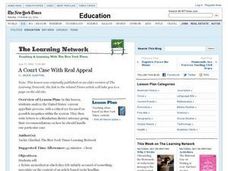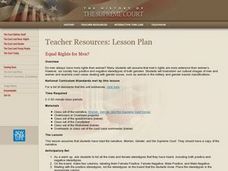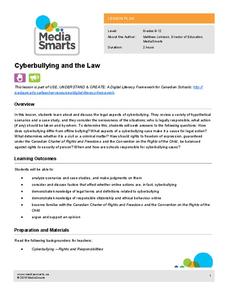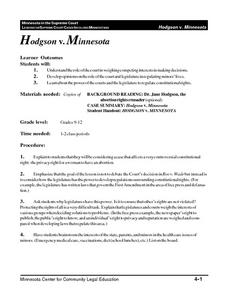Judicial Learning Center
Types of Court Cases
How can one court acquit someone of a crime, while another convicts the person of the same one? It's all because of the differences between civil and criminal trials. An informative resource provides scholars in the field of criminology...
Judicial Learning Center
Why Study Landmark Cases?
Why study landmark Supreme court cases? A helpful lesson offers a brief but valuable argument for the importance of these cases in the field of criminology. It introduces scholars to some key terms necessary for studying court cases and...
Curated OER
Pressing Cases
Students investigate famous criminal cases in which the media has played a significant role and reflect on how the news helps to shape attitudes and behaviors in their own lives.
Judicial Learning Center
Your 4th Amendment Rights
Americans love to learn about their rights, especially those that protect them from the government's power to invade their privacy. Young people are especially engaged by this topic. An informative lesson explores four Supreme Court...
Judicial Learning Center
Your 1st Amendment Rights
Why should classes care about the First Amendment? An engaging lesson serves as a powerful tool for answering just that. As all four cases in the lesson relate directly to freedom of expression in schools, young scholars explore the...
Judicial Learning Center
Getting Ready for Trial
A courtroom can be a scary place for the uninitiated. Get familiar with the process using a helpful overview of the activities that take place prior to both civil and criminal cases. The lesson explains the differences between...
Curated OER
Government Lesson Plan: Lesson Plan 9
Learners examine and compare/contrast the steps of criminal and civil cases. They define key vocabulary terms, develop an outline of a criminal and civil trial, and analyze the differences in standards of proof in legal cases.
Constitutional Rights Foundation
Arizona v. United States — States and Immigration Law
As part of a study of immigration law, class members read a summary of the Supreme Court case, Arizona v. United States. They then examine a series of examples and acting as federal court judges, must determine if the scenarios...
Curated OER
A Court Case with Real Appeal
Students analyze the United States' current appellate process, with a critical eye focused on possible inequities within the system. They then write letters to a Manhattan district attorney giving their recommendations on how he should...
Judicial Learning Center
Levels of the Federal Courts
The Supreme Court gets all the glory, but very few federal cases make it to the highest court. An interesting lesson explores the structure of the lower levels of the federal court system. In addition to outlining the organization of...
Curated OER
Indiana Courts: How Do They Work?
Students identify the branches of Indiana's judicial system and determine the differences between the different courts and different types of cases. Students create a flow chart showing how a court case works its way through the legal...
Curated OER
Equal Rights for Men?
Study the issue of gender bias in court cases with a resource that ponders the extent of gender equality. Learners examine cultural images of men and women and examine court cases dealing issues such as women in the military.
Judicial Learning Center
State Courts vs. Federal Courts
Popular culture often portrays the Feds as the most fearsome of law enforcement agencies. Yet, someone charged with a crime is considerably more likely to end up in a state court. The lesson, one of six covering the Organization of the...
Judicial Learning Center
Judicial Independence
Most people support the idea of an independent judiciary in theory until they hear about a court case that violates their principles. An informative resource explains why the concept is important. It also provides scholars of criminology...
Media Smarts
Cyberbullying and the Law
Research, role-playing, and reflection are the three “R’s” that form the basis of an examination of Cyberbullying. Although based on the Criminal Code of Canada, the included scenarios and case studies provide valuable resources for a...
Curated OER
Social Studies: MySpace as Crime solver
Students research how police use MySpace to apprehend criminals. They debate the pros and cons of this method and decide if the local policy needs to be changed. Students create a better policy for using the Internet and present it to...
Anti-Defamation League
Exploring Solutions to Address Radical Disparity Concerns
The deaths of Michael Brown, Eric Garner, and Tamir Rice, and the protests that followed the 2014 shootings, are the focus of a current-events activity that asks class members to brainstorm and research possible strategies to address the...
Curated OER
Role Playing Free Speech
Learners conduct research into looking at a free-speech issue. They role play the events surrounding a court case. The lesson includes guiding questions to help create context and determine areas of further study. The presentation...
Curated OER
Moot Court Preparation
Twelfth graders prepare themselves for a mock moot court. In groups, they are presented with an overview of each activity and research appellate cases related to the topic given to them. They identify regions of the country that have...
Curated OER
Police Use MySpace
Students interview law enforcement officials concerning their use of the Internet to catch criminals. They research how MySpace operates. They interview staff at MySpace and its uses. They write a news feature about a criminal case...
Curated OER
Hodgson v. Minnesota
Pupils investigate the role of and develop opinions of the court in weighing competing interests in making decisions. They examine the power of the courts and legislature to regulate constitutional rights.
Curated OER
Ghosts of Rwanda: Reconciliation and Reparations
Students examine a specific case of genocide participation in Rwanda. Working in groups, they simulate the courtroom drama, from the positions of victim, perpetrator, and court monitor. They conclude by writing essays on the...
Curated OER
Juvenile Court - The Law
An interesting lesson plan on juvenile law, and the juvenile court system. Young law makers are given a lengthy document to read on the basics of juvenile law, then they must answer some questions about what they've read. Additionally,...
Curated OER
The Juvenile Death Penalty
Sensitive material is discussed in this lesson. Please review to ensure that the content is suitable for your class. The topic is the Eighth Amendment and how the U.S. Supreme Court makes determinations about what constitutes cruel and...
Other popular searches
- Famous Criminal Cases
- Civil and Criminal Cases
- Criminal Cases Research
- Researching Criminal Cases
- Lawyers Criminal Cases























